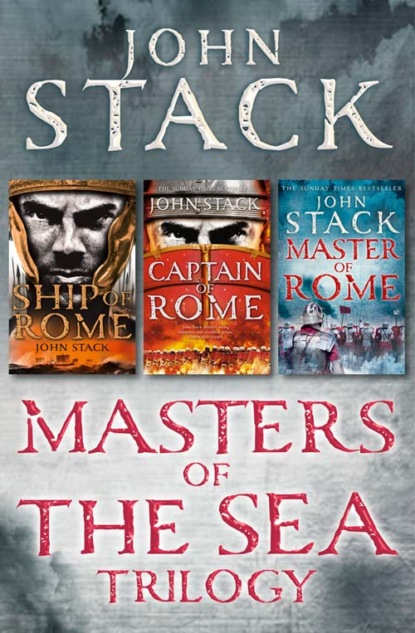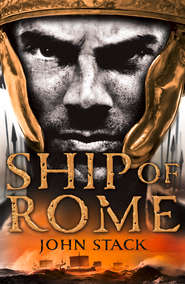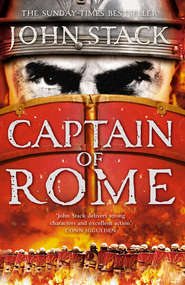По всем вопросам обращайтесь на: info@litportal.ru
(©) 2003-2025.
✖
Masters of the Sea Trilogy: Ship of Rome, Captain of Rome, Master of Rome
Автор
Год написания книги
2019
Настройки чтения
Размер шрифта
Высота строк
Поля
‘He’s here to inspect the legions before the spring campaign,’ Aulus replied. ‘He only arrived two days ago. He’s staying in the port commander’s villa.’
Atticus looked up at the villa overlooking the port. It was fifteen minutes away by foot, four minutes by horseback, but that was on a quiet day, when the streets were all but empty. Today the entire town seemed choked with equipment, slaves and draught oxen. He would need the marine legionaries to beat a path to the consul’s door.
‘Septimus,’ he called over his shoulder, ‘we need to get to the villa as quickly as possible.’
‘Understood,’ Septimus replied, and turned to his six men. ‘Squad … draw swords!’ he ordered, his words followed instantly by the distinctive sound of swords being drawn from their scabbards.
All activity around the soldiers ceased as the sound arrested the movement of every man in earshot. Those within range immediately drew back from the group, fearful of the razor-sharp killing sword of the Roman legions. A ripple ran through the crowd as word was passed quickly along the length of the dock and, like a gust of wind blowing through ripened corn, the crowd began to part in front of the soldiers. Septimus turned and slowly drew his own sword, holding it firmly before him, sensing the familiar weight of the weapon, remembering the last time he had drawn it only hours before.
‘Fall in behind,’ he said to Atticus as he looked beyond him to the channel opening before them. ‘Squad … double-quick time.’
The squad took off as one, their pace the ground-eating double-quick time that would get them to their destination, over two miles away, in fifteen minutes. Aulus watched them go until his view of them was lost, the slaves around him returning to work as if nothing had happened. But something had happened, Aulus thought, something had changed. The four legions on Sicily had seemed invincible, unbeatable, the best land army in the world. Now the Carthaginians had begun to exploit their best asset, as masters of the sea, and as surely as death follows life, if the fifty ships of the Punici were not stopped, they would strangle and starve forty thousand of Rome’s finest.
Atticus and Septimus mounted the final steps leading to the villa’s rooftop garden behind two of the consul’s black-cloaked praetorian guards, their long wait before being summoned forward by the guard commander further chafing Atticus’s nerves after his earlier angry exchanges with the praetorian commander in the villa’s courtyard. The praetoriani were notoriously arrogant, their privileged position as the guardsmen of the Senate setting them apart from and above the regular soldiers of the legions, and this particular guard commander, an ex-centurion of the Fourth Legion, had a glaring contempt for all ranks other than his own. He had initially refused the Aquila’s officers’ request for an audience with the consul out of hand, turning his back on them even as they spoke, as if the very effort of refusal was beneath him, and it was only when Atticus mentioned, with barely contained anger, that the entire campaign was now under threat that the guard commander stopped in his tracks to listen before agreeing to seek the consul’s permission for an audience.
Atticus and Septimus stood to attention as the praetorian guards came to a halt just inside the boundary of the garden, their arrival seemingly unnoticed by Gnaeus Cornelius Scipio, senior consul to the Senate of Rome, who was standing with his back to them, slowly and methodically splashing cold water from a basin onto his forearms and face. He reached out for a towel and one was immediately proffered by a large Nubian slave before he turned to face the two officers.
Atticus and Septimus saluted in unison, but the consul did not acknowledge the gesture as he poured himself a glass of wine, the pause giving Atticus a chance to study the man before him. He knew Scipio was a patrician, one of the elite of the Roman Republic, and his bearing showed all the hallmarks of a privileged upbringing. He was not a tall man, maybe two inches shy of six feet, but his stance gave the impression that he stood over everyone around him. He moved like a fighter, with long, slow, fluid movements that belied his obvious strength, and although his eyes were downturned, Atticus had the impression that he was fully aware of everyone around him. The consul looked up to face the two men, his eyes never leaving them as he took a drink from his glass, and both Atticus and Septimus knew that they were being assessed by one of the most powerful men in the Republic.
‘Report,’ he ordered.
‘I am Captain Atticus Milonius Perennis and this is Centurion Septimus Laetonius Capito of the marines. We are the commanding officers of the trireme Aquila out of the port of Locri, stationed in the Ionian Sea and Strait of Messina. This morning—’
‘Wait,’ Scipio interrupted. ‘I am familiar with the family name Laetonius,’ he said with a nod to Septimus, ‘but I have never heard of Milonius. What is the origin of your family?’
‘It’s Greek,’ Atticus replied, somewhat puzzled at the line of questioning, ‘from Brutium,’ indicating the region occupying the ‘toe’ of the Italian mainland.
‘So what is a Greek doing commanding a Roman vessel?’ the consul enquired, trying to gauge the young captain before him. He knew that many of the ships of the Roman navy were provided by provincial cities and so their crews were a mix of personnel from all corners of the Republic, but he had thought all the galleys were commanded by Roman citizens.
‘The origin of the name is Greek, but we are of Brutium, and citizens of the Republic. I joined the navy when I was fourteen and worked my way up to the rank of captain.’
Atticus had drawn himself to his full height as he spoke, and Scipio could sense the pride and determination behind the words when he spoke of his citizenship and rank. He recalled that Brutium had once been part of Magna Graecia, Greater Greece, a loose confederation of city-states whose founders had originated from the Greek mainland. Rome had absorbed the entire area less than a generation before as the legions washed the stain of Pyrrhus from the peninsula, and so now former enemies had become fellow citizens.
‘Continue with your report, Captain,’ Scipio said with a wave of his hand, his mind now tinged with a hint of mistrust as the Greek continued.
Atticus quickly recounted the morning’s action, emphasizing the enemy’s numbers and course.
Scipio listened while the captain spoke, his expression never changing. The consul was used to hiding his thoughts and emotions from those around him, and he had trained his face to remain impassive no matter what news was delivered. This report of a fleet of Carthaginian galleys shook him to his core, however, as he realized its implications. Scipio lifted his glass to take a drink and noted with satisfaction that his hand was rock steady. He turned to his fellow Roman.
‘Centurion, do you confirm this report?’
‘Yes, Consul, every detail,’ Septimus replied without hesitation, sensing his friend Atticus bristle as his honesty was questioned. Scipio continued to hold the gaze of each man, his face a mask of indifference. Atticus immediately mistook his demeanour for a sign that he had missed the point of the report entirely.
‘Consul, the fleet was moving north through the strait. Their destination must be Thermae or Panormus further along this coast. From there they could range along the entire northern coast, attacking our transport barges as they cross from the mainland.’
Scipio had looked up the moment Atticus began to speak and he listened intently until the captain finished his sentence. It was only then that his expression changed. Not to one of understanding and concern as Atticus had expected, but to one of rage.
‘How dare you speak without permission?’ he growled at Atticus. ‘Do you think me a fool? Hold your tongue!’
Atticus was stunned by the consul’s outburst and silently cursed the manner of the man standing before him. His ship had fought hard to escape the Carthaginian fleet and for the past eight hours he had pushed the trireme to its limits. For him there was not a moment to lose and the unreadable manner of the consul irked him. The port commander at Brolium, the man he had hoped to report to, spoke to his captains as near equals, accepting their opinions and dissent in any private discussions. This man, however, this politician of Rome, kept his own counsel and invited none.
‘You men will accompany me to the legion encampment immediately,’ he said brusquely to Atticus and Septimus. ‘Wait for me in the courtyard.’
The two men saluted and turned on their heels. The consul’s personal guard quickly formed up around them and they were escorted from the rooftop.
Scipio walked to the rail and looked out over the docks below. The tempo of the labour there had not abated throughout the afternoon, but it now seemed that they had broken the back of the task of unloading the fleet of barges. With a new threat emerging in the waters beyond the harbour, Scipio wondered briefly if these would be the last supplies for the fighting legions on Sicily.
Hannibal Gisco sat in his cabin on the flagship Melqart, drinking wine from a golden goblet. The goblet had once belonged to the prefect of Agrigentum, the city Gisco had captured over a year before. Along with the entire city Council, the prefect had been stoned to death, punishment for closing the city gates against the Carthaginians’ initial advance. The man had not died well. In the corner of the cabin, reclined on a couch, Hamilcar Barca sat watching the admiral in silence. He noticed the slight smile on Gisco’s face, wondering what thought had prompted the smile, an expression so different from the frustration Gisco had displayed an hour before when he had first returned to the flagship.
Hamilcar had listened then as Gisco outlined the escape of a Roman trireme, concealing his shock at the anger that seemed to emanate from every pore of the admiral’s body. The slaves had worked with practised speed as Gisco talked, stripping the admiral of his armour and tunic, bathing his skin with scented water before massaging oil into the obviously tensed muscles of his upper body and shoulders. The familiar routine had gone some way to assuage Gisco’s frustration, but only now, as a lingering smile remained on the admiral’s face, did Hamilcar judge the moment right to discuss the implications of the Roman ship’s escape.
‘You said she was a coastal galley?’ Hamilcar asked, keeping his voice even, suppressing all elements of judgement.
‘Yes, lighter than one of our own. Probably a pirate hunter.’
Hamilcar nodded, allowing a silence to develop once more, his experience in the Council chamber of Carthage dictating his line of questioning.
‘She will flee along the northern coast of Sicily then?’
Gisco grunted a reply, disliking the young man and his presence on board the flagship. The Council’s interference in military affairs had reached new depths with the appointment of Barca, the Council’s ‘envoy’, an advisory observer who shadowed Gisco’s command.
‘No doubt to the nearest Roman port, where she will give advance warning to all that our fleet has entered these waters …’ Hamilcar persisted, trying to get Gisco to reveal his thoughts on the change in circumstances.
‘It is of little consequence, Barca, the Romans would have found out soon enough,’ Gisco replied, avoiding any admission that his failure to capture the Roman trireme was in any way significant.
A sudden knock on the door interrupted their conversation.
‘Come,’ Gisco ordered.
The commander of his personal guard, Cronus, entered. He snapped to attention.
‘Captain Maghreb of the Hermes reporting as ordered, Admiral.’
‘Good, show him in, Cronus.’
Gisco rose from his chair. He leaned over his desk, strewn with Carthaginian maps of the waters around the eastern and northern coasts of Sicily. Maghreb entered, led by the guard commander and flanked by four more soldiers. His sword and dagger had been removed. He stood to attention and saluted.
‘Reporting as ordered, Admiral,’ he said, trying to hide the tension in his voice. He failed. Gisco could sense the captain’s fear.
‘Captain,’ the admiral began, ‘I have studied all our maps and charts of these waters. I can find no reference to the whirlpool we encountered this morning. The Romans tricked us using superior local knowledge. We could not have been aware of their plans.’
Maghreb visibly relaxed and, although he still stood to attention, Gisco noticed that the tension had gone out of his shoulders and he was no longer holding his breath.
‘They will not escape the next time they cross our path,’ Maghreb added, sensing the admiral’s mood.
‘No, Captain, they will not,’ Gisco replied, his voice cold.
The two men stood facing each other in silence and Maghreb felt uncomfortable once more under Gisco’s gaze. The admiral’s expression was impossible to read, but the captain sensed that he would evade blame for the escape of the Roman galley.









